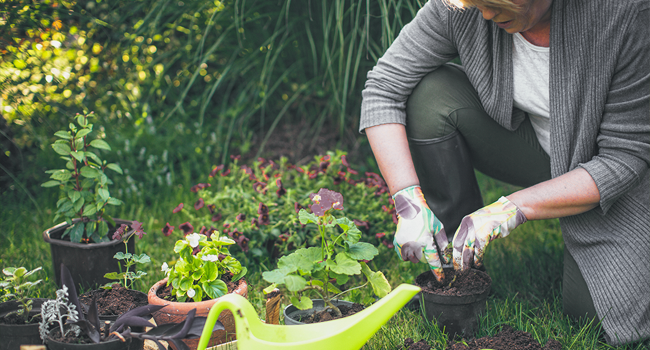Gardening is a hobby that transcends mere cultivation. It's a journey of nurturing life, a dance with nature's rhythm, and a source of solace for countless enthusiasts. Beyond the beautiful blooms and bountiful harvests, gardening offers myriad therapeutic benefits that nourish the body and soul. This article will explore gardening and how this green pastime cultivates plants and wellness.
Introduction to Gardening as Therapy
Gardening is a symphony of growth, a dance of life that echoes through seasons. It's a serene sanctuary where hands touch the Earth, nurturing life from seed to full bloom. But beyond the tangible results, gardening is a form of therapy—an art that cultivates wellness in a world often consumed by the pace of modern life.
As human beings, we are innately connected to the natural world. Gardening provides an avenue to strengthen this bond, offering a respite from the digital noise and an opportunity to reconnect with the elements that sustain us.
Mindful Gardening: A Path to Present Moment Awareness
Mindfulness, the practice of being fully present in the moment, finds a perfect companion in gardening. As you tend to your plants, your attention becomes attuned to the soil between your fingers, the rustle of leaves in the breeze, and the symphony of colors that adorn your garden. Planting a seed and nurturing it to maturity becomes a lesson in mindfulness—an invitation to immerse yourself in the beauty of the present.
Gardening encourages a slow, deliberate pace that contrasts with the hurried nature of modern life. Time seems to stretch in the garden, and worries fade as you engage in the rhythmic tasks of weeding, watering, and pruning. This focus on the present moment offers respite from the constant stream of thoughts and demands that often overwhelm our minds.
Physical Health and Fitness
Gardening is not only a balm for the mind and soul; it's also a tonic for the body. The physical exertion involved in digging, planting, and hauling bags of soil provides a low-impact workout that engages various muscle groups. Bending, stretching, and lifting contribute to improved flexibility, strength, and cardiovascular health.
Spending time outdoors in the garden exposes you to natural light, essential for the body's production of vitamin D—a nutrient crucial for bone health and immune function. Combining fresh air, sunlight, and physical activity creates a holistic approach to well-being.
Stress Reduction and Mental Clarity
The garden is a sanctuary of serenity, where the cacophony of daily life is replaced by the gentle whispers of leaves and the soothing melodies of birdsong. Gardening—sowing seeds, nurturing seedlings, or tending to established plants—offers a tranquil escape from the outside world's demands.
The sensory experience of gardening—feeling the Earth's texture, inhaling the fragrance of flowers, and listening to the rustling of leaves—engages multiple senses and redirects your focus. This immersion in the sensory present provides a much-needed respite from the constant mental chatter that often accompanies stress and anxiety.
Nurturing Patience and Persistence
Gardening is a lesson in patience, a reminder that growth cannot be rushed. As you plant a seed and wait for it to sprout, you're reminded that transformation takes time. Nurturing a plant from infancy to maturity instills a sense of responsibility and commitment.
In a world of instant gratification, the garden teaches the value of persistence. Weeds may resurface, and setbacks may occur, but the dedicated gardener persists. The eventual sight of a blooming flower or a bountiful harvest becomes a testament to the rewards of patience and perseverance.
Creating Personal Sanctuaries: Healing Gardens
Some gardens go beyond aesthetics; they are intentionally designed to promote healing and well-being. Healing gardens are carefully crafted spaces that incorporate elements known to reduce stress and enhance relaxation. Water features, aromatic plants, and comfortable seating areas are thoughtfully arranged to create an atmosphere of tranquillity.
The sensory elements of a healing garden—such as the sound of trickling water, the scent of lavender, and the sensation of cool grass underfoot—engage the senses and offer a haven of respite. These sanctuaries serve as outdoor refuges where visitors can find solace, reflection, and a reprieve from life's challenges. Healing gardens are not only for those seeking relief; they also provide caregivers, patients, and individuals dealing with various forms of stress an opportunity to rejuvenate and heal.
Connecting with Community and Sharing Knowledge
Gardening is a hobby that nurtures not only plants but also relationships. Community gardens, where individuals come together to cultivate shared plots and foster connections and camaraderie. These spaces become hubs of interaction, where people from diverse backgrounds converge, united by a shared passion.
Participating in community gardening events, workshops, and volunteering opportunities introduces you to a network of fellow enthusiasts. In these communal spaces, you grow plants and cultivate relationships that enrich your life.
Gardening for All Ages and Abilities
Gardening is a universal hobby that accommodates all age groups and physical abilities. Children wonder about planting and watching seeds sprout, fostering a sense of responsibility and connection to nature. Seniors discover solace in the garden, engaging in gentle activities contribute to their physical and emotional well-being.
Adaptable gardening techniques allow differently-abled individuals to enjoy the benefits of tending to plants. Raised beds, vertical gardening, and container gardening cater to diverse physical needs. Gardening transcends limitations, proving that the joy of nurturing life knows no boundaries.
Eco-Therapy: Gardening's Impact on the Environment
Gardening isn't just a personal pursuit—it positively impacts the environment. Planting trees, flowers, and shrubs contributes to greening urban spaces and enhancing biodiversity. Gardens attract pollinators, such as bees and butterflies, crucial for maintaining ecosystems and supporting food production.
Gardening also instills a sense of environmental responsibility. As you care for your garden, you become attuned to the cycles of nature, the importance of water conservation, and the delicate balance of ecosystems. Nurturing plants fosters a deep connection to the Earth and a commitment to its well-being.
Conclusion: The Harvest of Wellness
Gardening is a portal to well-being—a journey that transforms nurturing plants into an exploration of self-care. In the garden's embrace, stress dissipates, worries are replaced by wonder, and moments of mindfulness abound. As you watch seeds become seedlings, witness blooms unfurl, and harvest the fruits of your labor, you're gathering wellness in its purest form.
The therapeutic benefits of gardening extend beyond the boundaries of soil and sunlight. They reach into the heart, soothe the mind, and invigorate the spirit. Gardening is an expression of the innate human connection to the Earth—a reminder that simplicity and beauty can be found amidst the complexities of life by planting a seed and nurturing it into energy. As you cultivate your garden, remember that you're also cultivating well-being. With each step in the park, you're sowing the seeds of a healthier mind, body, and soul. So, whether you have a sprawling backyard or a cozy balcony, embrace gardening as a journey towards wholeness that celebrates life, growth, and the enduring connection between humans and nature.
FAQs
Is gardening suitable for individuals with limited outdoor space?
Absolutely! Container gardening, vertical gardening, and indoor plants offer options for individuals with limited outdoor space.
Can gardening benefit mental health conditions like depression and anxiety?
Yes, gardening has been shown to have positive effects on mental health. Engaging with nature, practicing mindfulness, and experiencing the sensory elements of a garden contribute to improved mood and well-being.
What if I need to gain gardening experience?
Gardening is a learning process. Start with simple plants and gradually expand your knowledge. Online resources, gardening clubs, and local nurseries are excellent sources of information and guidance.
Can children benefit from gardening as therapy?
Absolutely. Gardening provides children a hands-on connection to nature, teaches responsibility, and encourages exploration. It's a valuable way for them to develop an appreciation for the environment.
How can I create a healing garden in my own space?
Designing a healing garden involves incorporating sensory elements like water features, aromatic plants, and comfortable seating areas. Prioritize tranquillity and relaxation in the layout and choose plants that engage the senses positively.
Embrace Wellness in Your Garden
Gardening is an invitation to embrace wellness amid nature's beauty. You're nourishing the plants and your well-being with every seed you plant, every blossom you admire, and every moment you spend in the garden. So, pick up your trowel, dig your hands into the soil, and embark on a journey of self-care and growth through the therapeutic art of gardening.




